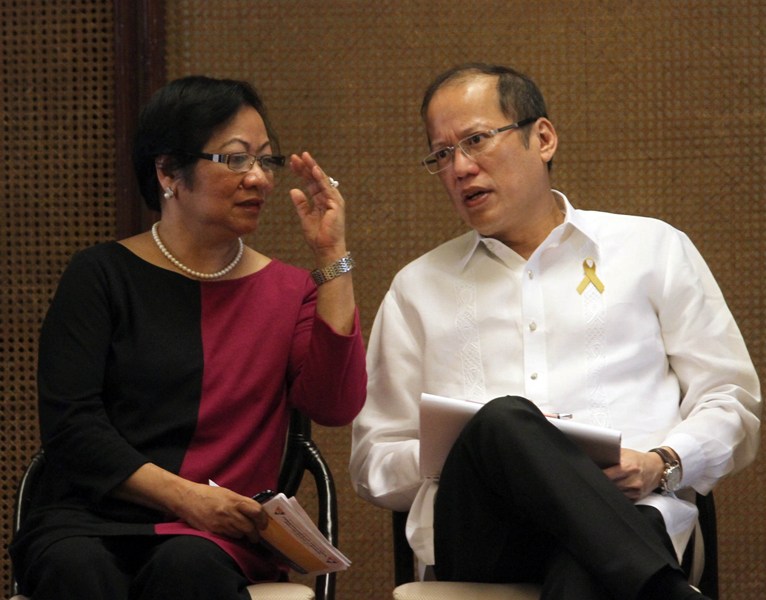Breaking
Baldoz credits social partners for improved PHL rank in ‘labor freedom’

Secretary of the Department of Labor and Employment Rosalinda Dimapilis-Baldoz and President Benigno Aquino III. Photo courtesy of Malacanang Photo Bureau.
MANILA — Labor and Employment Secretary Rosalinda Dimapilis-Baldoz has credited its tripartite social partners for the country’s latest achievement, its 8.5 points improvement in ‘labor freedom’, one of the 10 economic freedoms yearly measured in countries around the world by the Heritage Foundation and The Wall Street Journal, and overall, its inclusion among the 10 top countries with improved performances in the list of the world’s freest economies.
In a press release commenting on the results of the 2015 Index of Economic Freedom released the other day, the labor and employment chief said this is the highest jump of the Philippines in this economic freedom indicator in the last 10 years.
The Economic Freedom Index measures 10 freedoms grouped into four categories as follows: rule of law (property rights and freedom from corruption); government size (fiscal freedom and government spending); regulatory efficiency (business freedom, labor freedom, and monetary freedom); and open markets (trade freedom, investment freedom, and financial freedom.
In the 2015 Economic Freedom Index, the Philippines’ score in labor freedom is 58.2, an increase of 8.5 over last year’s Labor Freedom Index, placing the country 107th in the world rankings.
According to the Heritage Foundation, the labor freedom component is a quantitative measure that considers various aspects of the legal and regulatory framework of a country’s labor market, including regulations concerning minimum wages, laws inhibiting lay-offs, severance requirements, measurable regulatory restraints on hiring and hours worked.
There are six quantitative sub-factors weighted equally and counted as one-sixth of the labor freedom component. These are the following: (1) ratio of minimum wage to the average value added per worker; (2) hindrance to hiring additional workers; (3) rigidity of hours; (4) difficulty of firing redundant workers; (5) legally-mandated notice period; and (6) mandatory severance pay.
“The labor freedom score of the country in this latest index reflects the country’s performance in improving labor market regulation efficiency and affirms the positive trends in other similar economic performance measures, such as the Global Competitiveness Report of the World Economic Forum where the Philippines continues to register improvements in labor market efficiency, one of 12 competitiveness pillars measured by the Report,” said Secretary Baldoz.
In the Global Competitiveness Report 2014-2015, the Philippines exhibited tremendous progress in improving its global competitiveness in the labor market efficiency pillar, climbing nine (9) rungs from its 100th spot in the 2013-2014 GCI to 91st in the current 2014-2015 rankings. This brings to 20 rungs the Philippines had leapt in the labor market efficiency pillar since 2010, when it held 111th spot in the GCI rankings.
Baldoz cited the numerous initiatives of the Philippines, through the DOLE, in its effort to strengthen its ‘labor freedom’, including the adoption of tripartite-endorsed reforms, such as the two-tier wage system, productivity incentives, promoting legitimate, responsible, and ethical sub-contracting (D.O. 18-A), regulatory impact assessment on the apprenticeship and PESO legislative proposals, the institutionalization of the new Labor Laws Compliance System, active employment facilitation programs, the enactment of the tripartite-supported law on the lifting of the prohibition of nightwork for women, and Labor Code reforms.
“All these initiatives contribute to our efforts that have brought significant improvements in the labor market and which are now being recognized,” Baldoz explained.
The Philippines’ economic freedom score in the 2015 Economic Freedom Index is 62.2, placing the country’s economy the 76th freest in the world, thus turning the country from its previous years’ ranking as “mostly unfree” to become “moderately free” in the last two years of the administration of President Benigno S. Aquino III.
The score is 2.1 percent higher than in the last Index, making the Philippines one of 10 who registered best score improvements in the 2015 Index.
In the Asia-Pacific, the Philippines is the 13th freest among 42 countries, and its overall score is above the world (60.4) and regional averages (58.8).
The Economic Freedom Index is an annual guide published by the Wall Street Journal and the Heritage Foundation that documents the positive relationship between economic freedom – the fundamental right of every human being to control his or her own labor and property – and a variety of positive social and economic goals.





















